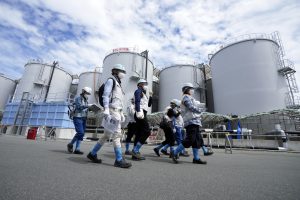The operator of the devastated Fukushima Daiichi Nuclear Power Plant, Tokyo Electric Power Company (TEPCO), has begun releasing treated wastewater into the Pacific Ocean despite fierce opposition from China and South Korea.
Tensions between China and Japan have escalated, with the Japanese embassy in China reporting phone harassment and protests. Japanese schools across China have also been targeted. They say eggs and rocks have been thrown and students have been verbally abused by strangers.
In response, Japan’s Ministry of Foreign Affairs warned Japanese nationals in China to keep a low profile. They recommend that expats avoid speaking Japanese in public. Security had also been strengthened around the Japanese embassy in Beijing.
On Monday, Japan urged China to tackle the public outbursts against Japanese nationals. Foreign Ministry representative Namazu Hiroyuki demanded China “call on people to act calmly and do everything possible to ensure the safety of Japanese residents in China.”
Japan’s push to win acceptance from the international community has not gone to plan. The International Atomic Energy Agency (IAEA) and Japan’s Nuclear Regulation Authority approved the safety of the newly constructed release facility. The IAEA publicly shared their scientific findings on the removal and concentration of the remaining radioactive isotope, tritium.
Since the start of the release last week, the concentration of tritium is being checked on a daily basis. TEPCO has reported that the amount of tritium has remained below the detection limit of 10 becquerels per liter.
But China maintains that Japan has not proved the true accuracy of the data on the contaminated water or the completeness and effectiveness of the monitoring program. Chinese officials have demanded that Japan immediately halt the release of wastewater into the Pacific Ocean.
China also instituted a ban on all seafood from Japan, asserting that “neighboring countries have the right and responsibility to take legitimate legal measures to ensure a sound marine environment.” China and Hong Kong are major importers of Japanese seafood and the ban has seen a 30 percent fall in sales compared to last month.
Japan has warned that it will bring a case to the World Trade Organization over China’s seafood import ban.
Meanwhile in South Korea, while the government has verified the IAEA’s safety checks, demand for salt has skyrocketed as consumers hoard sea salt amid fears that future supplies will be contaminated with the wastewater. Public opinion polls show that the majority of people in South Korea are opposed to the plan. Protests demanding that the release be called off have been held outside the Japanese embassy.
The Democratic Party, the largest opposition party in South Korea, has also criticized Japan as being on its way to creating the worst environmental disaster in human history. In its response, the party has leveraged rhetoric from wartime injustices inflicted on Japan’s annexation of Korea between 1910 to 1945. They say they will “fight till the end” to save the human race.
TEPCO says the wastewater release is a necessary step in decommissioning reactors that were destroyed by a massive earthquake and tsunami in 2011, which killed more than 30,000 people. There are more than 1,000 storage tanks filled with radioactive water that was used to cool nuclear debris trapped in the damaged reactors. The water release is set to continue until 2050.
TEPCO says the storage tanks will be dismantled to make space for other decommissioning projects – namely, figuring out what to do with the 880 tonnes of nuclear fuel melted at the bottom of three damaged reactors. The extreme radiation, heat, and the position of the once-molten fuel, which has turned into rock, makes it difficult to extract with current technology. There is also the long-term issue of the nuclear sludge generated from the purification and treatment process, known as ALPS.
Meanwhile, Japan unveiled a rescue plan valued at 80 billion yen ($552 million) to help the fishing industry given the adverse impact to its international reputation and brand. This week Japanese Prime Minister Kishida Fumio and three cabinet ministers took part in a Fukushima seafood publicity campaign, tasting fish on television to show it is safe to eat.
Kishida also reprimanded Fisheries Minister Nomura Tetsuro for calling the water “contaminated” in front of reporters. The Kishida administration is pushing for the water release to be referred to as ALPS-treated water instead.

































